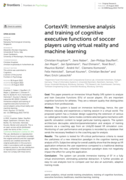New publication in Frontiers in Psychology [05.09.22]
Christian Krupitzer from the Department of Food Informatics is Co-Author of the publication "CortexVR: Immersive analysis and training of cognitive executive functions of soccer players using virtual reality and machine learning" in Frontiers in Psychology (Impact Factor: 4.232).The publication "CortexVR: Immersive analysis and training of cognitive executive functions of soccer players using virtual reality and machine learning" by Christian Krupitzer (Department Food Informatics and Computational Science Lab, University of Hohenheim, Stuttgart, Germany) with the co-authors, Jens Naber (Chair of Information Systems II, University of Mannheim, Mannheim, Germany), Jan-Phillipp Stauffert (HCI Group, University of Würzburg, Würzburg, Germany), Jan Mayer (TSG Research Lab, Zuzenhaussen, Germany), Jan Spielmann (TSG Research Lab, Zuzenhaussen, Germany), Paul Ehmann (TSG Research Lab, Zuzenhaussen, Germany), Noel Boci (Chair of Information Systems II, University of Mannheim, Mannheim, Germany), Maurice Bürkle (Chair of Information Systems II, University of Mannheim, Mannheim, Germany), André Ho (Chair of Information Systems II, University of Mannheim, Mannheim, Germany), Clemens Komorek (Chair of Information Systems II, University of Mannheim, Mannheim, Germany), Felix Heinickel (Software Engineering Group, University of Würzburg, Würzburg, Germany), Samuel Kounev (Software Engineering Group, University of Würzburg, Würzburg, Germany), Christian Becker (Chair of Information Systems II, University of Mannheim, Mannheim, Germany), Marc Erich Latoschik (HCI Group, University of Würzburg, Würzburg, Germany) was published in Frontiers in Psychology, Frontiers (Impact Factor: 4.232).
Goal: This paper presents an immersive Virtual Reality (VR) system to analyze and train Executive Functions (EFs) of soccer players. EFs are important cognitive functions for athletes. They are a relevant quality that distinguishes amateurs from professionals. Method: The system is based on immersive technology, hence, the user interacts naturally and experiences a training session in a virtual world. The proposed system has a modular design supporting the extension of various so-called game modes. Game modes combine selected game mechanics with specific simulation content to target particular training aspects. The system architecture decouples selection/parameterization and analysis of training sessions via a coaching app from an Unity3D-based VR simulation core. Monitoring of user performance and progress is recorded by a database that sends the necessary feedback to the coaching app for analysis. Results: The system is tested for VR-critical performance criteria to reveal the usefulness of a new interaction paradigm in the cognitive training and analysis of EFs. Subjective ratings for overall usability show that the design as VR application enhances the user experience compared to a traditional desktop app; whereas the new, unfamiliar interaction paradigm does not negatively impact the effort for using the application. Conclusion: The system can provide immersive training of EF in a fully virtual environment, eliminating potential distraction. It further provides an easy-to-use analyzes tool to compare user but also an automatic, adaptive training mode.
The publication is available at: www.frontiersin.org/articles/10.3389/fpsyg.2022.754732


